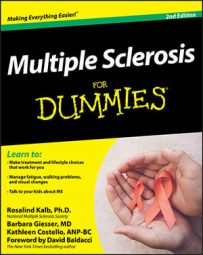Researchers are busy studying every aspect of multiple sclerosis (MS) — searching for ways to treat the symptoms and slow the disease course more effectively, cure the disease so that function is restored in those who have lost it, and, ultimately, find a way to prevent it so that no one ever has to deal with the challenges of MS again. Here is an overview of some promising treatment options that are currently under study.
MS research: Can vitamin D help prevent MS?
Early exposure (even before birth!) may play a role in a person’s risk of getting MS. People born in November in the northern hemisphere are at lower risk of developing MS than people born at other times of the year — perhaps because their mothers had more exposure to the sun (and therefore vitamin D) during their pregnancy.
Scientists are using animal studies to try and confirm this finding. They have shown that mouse babies born to moms who are deficient in vitamin D have a greater risk of developing a laboratory disease that mimics MS. And, mice babies that receive supplements of vitamin D right after birth have a lower risk of developing MS.
Early sunlight exposure in humans also seems to matter. In a twin study — in which one had MS and the other did not — the twin without MS had more time in the sun (and therefore more vitamin D) than the twin with MS. More research is needed to confirm this intriguing finding. In the meantime, talk to your doctor about how much vitamin D and time in the sun you or your children might need.
MS research: What medications are on the horizon?
Although no one can predict which medications will receive FDA approval, here are some hot items that have completed or are in phase III clinical trials:
BG-12: An oral medication taken two times daily
Alemtuzumab: An intravenous infusion, taken three to five days once a year
Daclizumab: An injected medication taken monthly
Ocrelizumab: Two intravenous infusions taken two weeks apart, every six months
Teriflunomide: An oral medication taken daily
MS research: Could worms become an MS treatment?
A new treatment for people with MS might come from worms. In one study, 12 people with MS who were infected with parasites were compared to 12 people with MS who weren’t infected with parasites (the control group). The group with parasites had fewer MS relapses and lesions on MRI than the group without parasitic infections.
And when four of the infected group were treated for the parasites, they showed signs of increased inflammation in their central nervous system. In case you’re wondering why worms might do the trick, it’s because infection by a worm or other parasite appears to slow or redirect the immune system so that it won’t destroy the parasite.
If the worm studies show benefit for persons with MS, researchers may discover from the worms a new way to slow down the overactive immune system in MS.
MS research: Can exercise improve your memory?
The word is out. Exercise is good for increasing physical fitness, enhancing cardiovascular health, and maintaining a healthy weight. It can even help lower high cholesterol. People with MS have been encouraged to exercise for these and other physical health reasons, but now data indicate that exercise may be good for the brain as well.
People with various types of cognitive problems have been shown to have improved memory and thinking after participating in different forms of exercise. And now studies are under way to determine whether exercise can improve memory and thinking in folks with MS.
For up-to-date information on the research front, keep your eye on the National MS Society’s home page.

